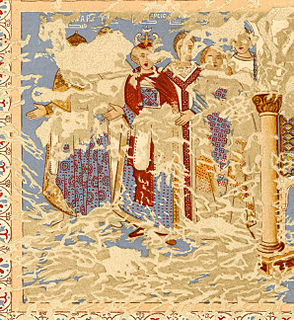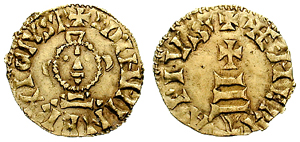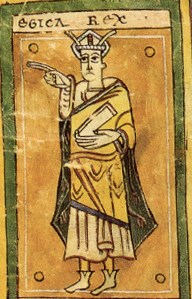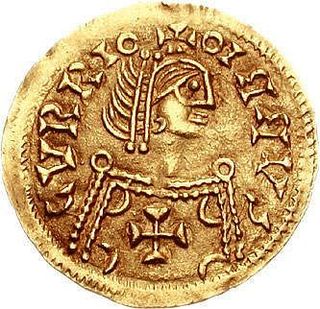Sources
- Thompson, E. A. The Goths in Spain. Clarendon Press: Oxford, 1969.
| | This article about a Roman Catholic archbishop from Spain is a stub. You can help Wikipedia by expanding it. |
Sisbert or Sisebert was the metropolitan archbishop of Toledo from 690 to 693 as successor to the famous Julian.
In the latter year, he was at the head of a conspiracy to dethrone the king, Egica. He planned to assassinate the king, Queen Liuvigoto, and four of their closest advisors: Frogellus, Theodomir, Liuvila, and Tecla. It seems likely that the conspirators took Toledo itself and minted coins in the name of Duke Sunifred, whom they intended to crown. However, Egica defeated them and called the Sixteenth Council of Toledo to deal with the rebels. Sisbert was brought forward to confess his guilt to the assemblage of bishops and other ecclesiastics and was penalised, he and his descendants being prohibited from holding palatine office. Exceptionally, Archbishop Felix of Seville was translated to Toledo and Archbishop Faustinus of Braga to Seville.
| | This article about a Roman Catholic archbishop from Spain is a stub. You can help Wikipedia by expanding it. |

Isidore of Seville was a Spanish scholar and cleric. For over three decades, he was Archbishop of Seville. He is widely regarded, in the words of 19th-century historian Montalembert, as "the last scholar of the ancient world".

Toledo is a city and municipality of Spain, capital of the province of Toledo and the de jure seat of the government and parliament of the autonomous community of Castilla–La Mancha. Toledo was declared a World Heritage Site by UNESCO in 1986 for its extensive monumental and cultural heritage.

Pedro González de Mendoza was a Spanish cardinal and statesman who served as Archbishop of Toledo (1482–1495), Archbishop of Sevilla (1474–1482), Bishop of Sigüenza (1467–1474), and Bishop of Calahorra y La Calzada (1453–1467).

Diego de Deza was a theologian and inquisitor of Spain. He was one of the more notable figures in the Spanish Inquisition, and succeeded Tomás de Torquemada to the post of Grand Inquisitor.

Ruderic was the Visigothic king in Hispania between 710 and 711. He is well-known as "the last king of the Goths". He is actually an extremely obscure figure about whom little can be said with certainty. He was the last Goth to rule from Toledo, but not the last Gothic king, a distinction which belongs to Ardo.

Erwig was a king of the Visigoths in Hispania (680–687).

Egica, Ergica, or Egicca, was the Visigoth King of Hispania and Septimania from 687 until his death. He was the son of Ariberga and the brother-in-law of Wamba.
Oppas, also spelled Oppa, was a member of the Visigothic elite in the city of Toledo on the eve of the Muslim conquest of Hispania. He was a son of Egica and therefore a brother or half-brother of Wittiza.
The Fifteenth Council of Toledo first met on 11 May 688 under King Egica. It was the king's first of three councils.
The Sixteenth Council of Toledo first met on 25 April 693, the second of Egica's three councils.

Pedro Segura y Sáenz was a Spanish Cardinal of the Roman Catholic Church who served as Archbishop of Toledo from 1927 to 1931, and Archbishop of Seville from 1937 until 1954. Segura was elevated to the cardinalate in 1927.

The Visigothic Kingdom or the Kingdom of the Visigoths was a kingdom that occupied what is now southwestern France and the Iberian Peninsula from the 5th to the 8th centuries. One of the Germanic successor states to the Western Roman Empire, it was originally created by the settlement of the Visigoths under King Wallia in the province of Gallia Aquitania in southwest Gaul by the Roman government and then extended by conquest over all of Hispania. The Kingdom maintained independence from the Eastern Roman or Byzantine Empire, whose attempts to re-establish Roman authority in Hispania were only partially successful and short-lived.

Enrique Almaraz y Santos S.T.D. was a Cardinal of the Roman Catholic Church and Archbishop of Seville and, later, Archbishop of Toledo and so Primate of Spain.

Don Luis María Cardinal de Borbón y Vallabriga, Farnesio y Rozas, son of a morganatic marriage of Luis de Borbón y Farnesio, Infante of Spain and 13th Count of Chinchón, and wife María Teresa de Vallabriga y Rozas, Español y Drummond, was the 14th Count of Chinchón (1785–1803), Grandee of Spain First Class, with a coat of arms of Bourbon, and 1st Marqués de San Martín de la Vega.

Rodrigo Jiménezde Rada, also known as Archbishop Don Roderic of Toledo, was a Navarrese-born Castilian Roman Catholic bishop and historian.

Gaspar de Borja y Velasco was a Spanish cardinal, ecclesiastic and politician. He belonged to the house of Borgia and served as Primate of Spain, Archbishop of Seville, Archbishop of Toledo and viceroy of Naples. He was the great-great-great-great-grandson of Pope Alexander VI.
Gonzalo Pérez 'Gudiel' (1238/9–1299), simply Gonzalo Pérez during his life, and wrongly Gonzalo García Gudiel in later church tradition, was a Castilian prelate and statesman in the service of kings Alfonso X and Sancho IV and Pope Boniface VIII. He was Bishop of Cuenca (1272) and Burgos (1275) and Archbishop of Toledo (1280), the first official Primate of Spain (1285) and finally Cardinal-bishop of Albano (1298) at the curia Romana. His early career was that of an international scholar, before he settled into royal service.

Fernando Niño de Guevara was a Spanish cardinal who was also Archbishop of Seville and Grand Inquisitor of Spain.

Infante Sancho of Castile was Archbishop of Toledo and Chancellor of Castile from 1259 until his death.
Suniefred was a Visigothic nobleman who rebelled during the reign of Egica and briefly ruled as king from Toledo.